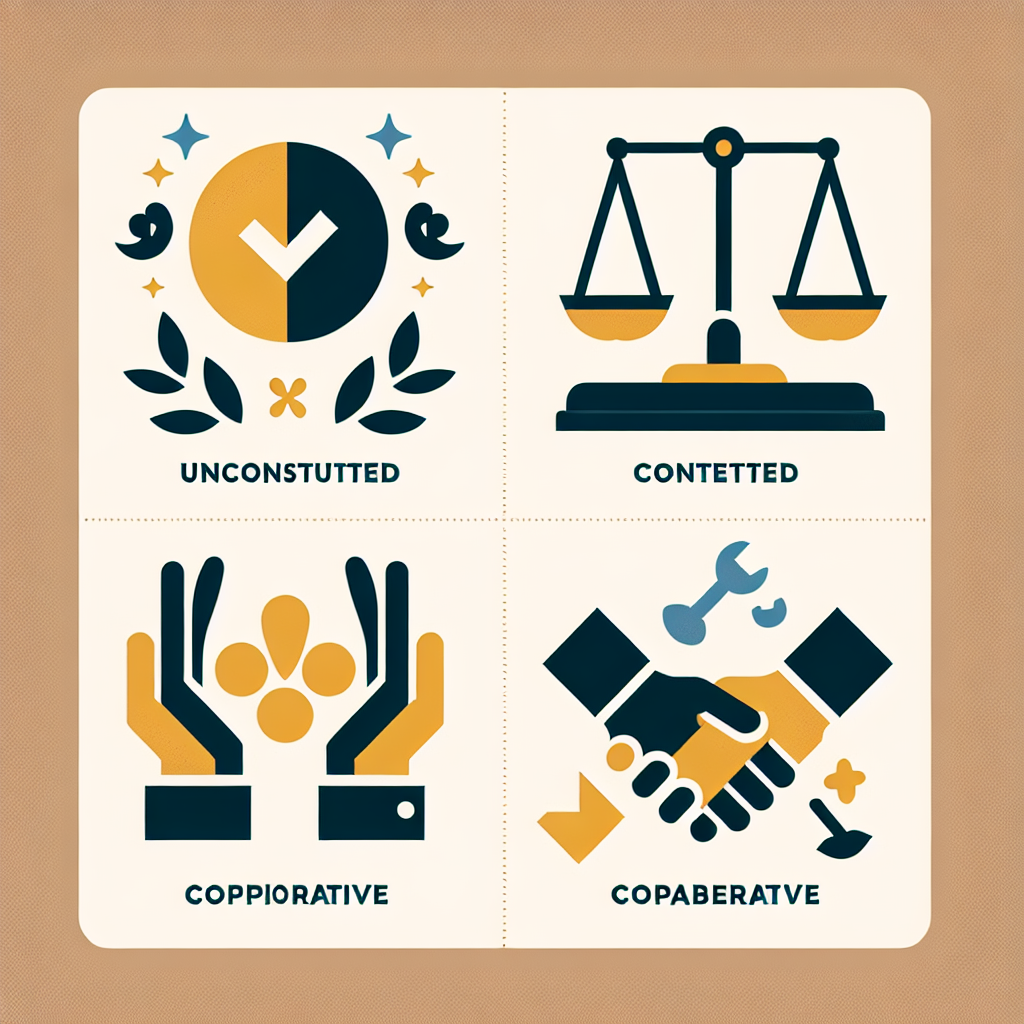Understanding Family Divorce Law: A Comprehensive Guide for Couples
Introduction
Welcome to the rollercoaster ride known as family divorce law! Whether you’re contemplating a split or already knee-deep in the process, understanding the legal landscape is crucial. Think of it as your GPS for navigating the often murky waters of divorce because let’s face it, you don’t want to end up lost in a maze of legal jargon and paperwork.
Divorce isn’t just about splitting assets; it’s a multifaceted journey that involves emotional upheaval, child custody battles, and maybe even some alimony negotiations. If you’re thinking, “What on earth is alimony?” or “Do I really need a divorce lawyer?” don’t worry! This guide is here to break down everything you need to know.
In this comprehensive guide, we’ll explore:
- The ins and outs of family divorce law
- How to choose the right family law attorney
- The different types of divorce uncontested vs. contested (and why it matters)
- Key components like child custody and marital property division
- Navigating family court without losing your mind
So grab your favorite beverage, get comfy, and let’s dive into the world of family divorce law together. Spoiler alert: it might not be as scary as it sounds!

What is Family Divorce Law?
Family divorce law is like the rulebook for navigating the often choppy waters of ending a marriage. It encompasses a range of legal issues that arise when couples decide to part ways, ensuring that both parties are treated fairly and that any children involved are protected.
This area of law covers various aspects, including:
- Marital property division: How assets and debts are split between spouses.
- Child custody: Determining where the kids will live and how decisions about their upbringing will be made.
- Child support: Financial obligations one parent has to support their children after separation.
- Alimony or spousal support: Payments one spouse may be required to make to the other after divorce.
- Legal separation: An alternative to divorce where couples live apart but remain legally married.
- Divorce mediation: A process where a neutral third party helps couples reach an agreement without going to court.
Importance of Understanding Family Divorce Law
Understanding family divorce law is crucial for anyone considering or undergoing a divorce. Think of it as your GPS in a complicated legal landscape. Without it, you might end up lost, taking wrong turns with potentially costly consequences!
Key Takeaway: Knowledge of family divorce law can help you make informed decisions about your future, protect your rights, and ensure that you achieve a fair outcome in your divorce proceedings. Whether it’s negotiating a divorce settlement or understanding your parental rights, being informed is half the battle!

The Role of a Family Law Attorney
When navigating the choppy waters of family divorce law, having a skilled family law attorney by your side is like having a seasoned captain at the helm. They not only know the lay of the land but also how to steer you through turbulent times. So, what exactly does a family law attorney do? Let’s break it down!
What a Family Law Attorney Does
- Legal Guidance: Your attorney provides expert advice on all matters related to divorce, including child custody, alimony, and marital property division.
- Representation: Whether you’re headed for an uncontested divorce or gearing up for a contested battle in family court, your divorce lawyer advocates for your best interests.
- Mediation and Negotiation: Many family law attorneys are skilled in divorce mediation, helping couples reach amicable agreements without escalating tensions.
- Document Preparation: From filing petitions to drafting separation agreements, they handle all the paperwork so you can focus on what matters most your family.
- Court Representation: If your case goes to trial, having an experienced attorney means you have someone who knows courtroom procedures and can present your case effectively.
Choosing the Right Divorce Lawyer
Selecting a divorce lawyer isn’t just about finding someone with impressive credentials; it’s about finding the right fit for you. Here are some tips to consider:
- Experience Matters: Look for an attorney who specializes in family law and has experience with cases similar to yours (think child custody battles or high net worth divorces).
- Communication Style: Choose someone who communicates clearly and listens to your needs. You want an attorney who makes you feel heard not just another case number!
- Reputation Counts: Check reviews and ask for referrals. A good family law firm will have testimonials that reflect their success in handling sensitive issues like spousal support or legal separation.
- Consultation: Most attorneys offer initial consultations. Use this time to ask questions about their approach and experience with specific aspects of family divorce law that pertain to you.
Takeaway: A knowledgeable family law attorney is essential for navigating the complexities of divorce. They can help ensure that your rights are protected while guiding you toward a resolution that works best for you and your loved ones.

Types of Divorce
When it comes to navigating the murky waters of family divorce law, understanding the different types of divorce can be a game-changer. Each type has its own set of rules, benefits, and potential pitfalls. Let’s break down the most common types so you can find the right path for your situation.
Uncontested Divorce
Think of an uncontested divorce as the smooth sailing option. Both parties agree on all major issues think child custody, alimony, and division of marital property without needing to go to court. This route is typically quicker and less expensive, making it ideal for amicable couples who want to avoid the drama!
- Lower legal fees
- Faster resolution
- Less emotional stress
Contested Divorce
If uncontested is smooth sailing, a contested divorce is like a stormy sea. Here, one or both parties can’t agree on key issues, leading to court battles that can stretch on for months or even years. It’s where a skilled family law attorney really earns their keep!
“Contested divorces often involve complex legal disputes over child custody and support, making it essential to have an experienced divorce lawyer by your side.”
Collaborative Divorce
This approach is like a team effort in which both parties work together with their respective attorneys to reach an agreement without going to court. Collaborative divorce encourages open communication and problem-solving while minimizing conflict. Plus, it allows couples to maintain more control over the outcome.
- More control over decisions
- Preservation of relationships (especially important if kids are involved)
- A focus on mutual interests rather than adversarial positions

Legal Separation vs. Divorce
A common misconception is that legal separation is just a prelude to divorce; however, they are distinct options under family divorce law. Legal separation allows couples to live apart while still being legally married perfect for those who want time apart without fully severing ties.
“Legal separation can be beneficial for couples who wish to maintain health insurance benefits or other financial ties.”
The Bottom Line
No matter which type of divorce you’re considering, understanding your options is crucial. Whether you’re opting for an uncontested divorce or bracing yourself for a contested one, consulting with a knowledgeable family law attorney will help you navigate these waters more smoothly.
If you’re unsure about what type suits your situation best, don’t hesitate to reach out for expert guidance! Every couple’s journey through family divorce law is unique make sure yours starts on the right foot.
Key Components of Divorce Proceedings
Diving into the world of family divorce law can feel like entering a maze where every corner leads to a new challenge. But fear not! Understanding the key components of divorce proceedings will help illuminate your path. Here’s what you need to know:
-
Marital Property Division
One of the first things to tackle is how to divide your marital property. This can include everything from your house and cars to that collection of vintage comic books you’ve been hoarding. States generally follow either equitable distribution or community property rules, so it’s crucial to know which applies to you.
-
Child Custody Arrangements
If kids are involved, child custody arrangements become a top priority. Courts typically favor arrangements that are in the best interest of the child, which might mean shared custody or one parent having primary custody. It’s essential to have a solid parenting plan in place that outlines visitation rights and responsibilities.
-
Child Support Obligations
Just when you thought it couldn’t get more complicated, enter child support! This is usually determined based on both parents’ incomes, the needs of the child, and sometimes even the custodial arrangement. A family law attorney can help ensure that these obligations are fair and manageable.
-
Alimony and Spousal Support
Ah, alimony the classic post-divorce financial support that keeps on giving (or taking). Depending on your situation, one spouse may be required to provide financial support to the other for a specified period or indefinitely. The amount can hinge on factors like length of marriage and standard of living during marriage.
-
Prenuptial and Postnuptial Agreements
If you’ve got a prenup or postnup in place, it can significantly affect how assets are divided during divorce proceedings. These agreements can provide clarity and peace of mind think of them as your financial safety net before jumping into marital waters.
-
Legal Separation vs. Divorce
Some couples opt for legal separation instead of jumping straight into divorce. This allows them to live apart while still being legally married perfect for those who want time apart without severing ties completely. However, it’s crucial to understand how this impacts things like alimony and property division down the line.
-
Divorce Mediation Process
Mediation is often a less contentious way to resolve disputes compared to traditional litigation. In mediation, both parties work with a neutral third party (the mediator) who helps facilitate discussions about property division, custody arrangements, and more. It’s like having a referee during an intense game but with fewer penalties!
Navigating Family Court
Ah, family court the place where emotions run high and legal jargon runs rampant. If you’re diving into the world of family divorce law, understanding how to navigate family court is like learning to ride a bike with no training wheels. It can be wobbly at first, but with a little guidance, you’ll be cruising in no time!
The Role of Family Court in Divorce Cases
Family court is where all the magic (and sometimes drama) happens when it comes to divorce. Think of it as the referee in a game where both parties are trying to score their best outcome whether that’s custody of the kids, alimony, or division of marital property.
- Custody Disputes: The court will determine child custody arrangements based on the best interests of the child. This could involve joint custody or sole custody arrangements.
- Support Orders: This includes child support and spousal support (alimony). The court decides how much one party should pay to support the other after separation.
- Division of Assets: Marital property division can get sticky. The court will decide how to fairly divide assets acquired during the marriage.
Understanding Court Procedures and Expectations
Before you step into the courtroom, it’s essential to know what you’re walking into. Here are some key points to keep in mind:
- Papers, Please: Make sure all your paperwork is in order! This includes your divorce petition, financial disclosures, and any other necessary documents.
- The Judge is Not Your Therapist: Family court is not the place for emotional outbursts or personal attacks. Keep it professional leave your feelings at home!
- Your Divorce Lawyer is Your Best Friend: Having a skilled divorce lawyer by your side can make a huge difference in navigating these waters. They’ll help you understand what to expect and represent your interests effectively.
Pro Tip: Consider mediation as an alternative to going through family court if both parties are open to it. It can save time and money while allowing for more amicable solutions.
Navigating family court doesn’t have to feel like walking through a legal maze blindfolded. With preparation and understanding of family divorce law, you’ll be better equipped to tackle whatever comes your way. Remember, knowledge is power and having an experienced family law attorney on your side can make all the difference!
Post-Divorce Considerations
Congratulations, you’ve made it through the divorce process! But hold your applause; the journey doesn’t end here. Navigating the post-divorce landscape can be just as tricky as the divorce itself, especially when it comes to family divorce law. Here are some key considerations to keep in mind:
-
Modification of Custody and Support Orders
Life is unpredictable. Whether it’s a job change, relocation, or a new relationship, circumstances can shift. If you find yourself needing to modify your custody or support orders, it’s essential to understand how to navigate this process. You might need a modification of custody order attorney who can help you present your case in family court.
-
Enforcement of Support Orders Attorney’s Role
If your ex is playing hide and seek with child support payments, you’ll want an attorney who specializes in enforcing support orders. They can help ensure that financial obligations are met, which is crucial for the well-being of your children.
-
Paternity Law and Its Implications for Parents and Children
Paternity isn’t just about who gets to wear the “World’s Best Dad” mug. Establishing paternity has legal implications for child custody and support rights. If you’re navigating these waters, consider consulting with a family law firm that specializes in paternity law.
-
Visitation Rights and Parenting Plans
A solid parenting plan is like a roadmap for co-parenting success. It outlines visitation rights and ensures that both parents remain involved in their children’s lives. If things get rocky down the line, having a clear plan can save you from unnecessary disputes.
In summary, understanding these post-divorce considerations will not only help you adapt but also pave the way for healthier relationships moving forward be it with your ex-partner or with yourself! So grab that legal advice like it’s popcorn at a movie theater; you’re going to need it as you navigate this new chapter!
- Modification of Custody and Support Orders
- Enforcement of Support Orders Attorney’s Role
- Paternity Law and Its Implications for Parents and Children
- Visitation Rights and Parenting Plans
< / section >< section >
Special Circumstances in Family Divorce Law
- High Net Worth Divorces
- Military Divorces
- Same-Sex Divorces
- Domestic Violence Considerations
- Grandparents’ Rights in Custody Cases
- Stepparent Adoption Processes
< / section >
< section >
Conclusion
< / section >
- Stepparent Adoption Processes
- Grandparents’ Rights in Custody Cases
- Domestic Violence Considerations
- Same-Sex Divorces
- Military Divorces
- High Net Worth Divorces
- Visitation Rights and Parenting Plans
